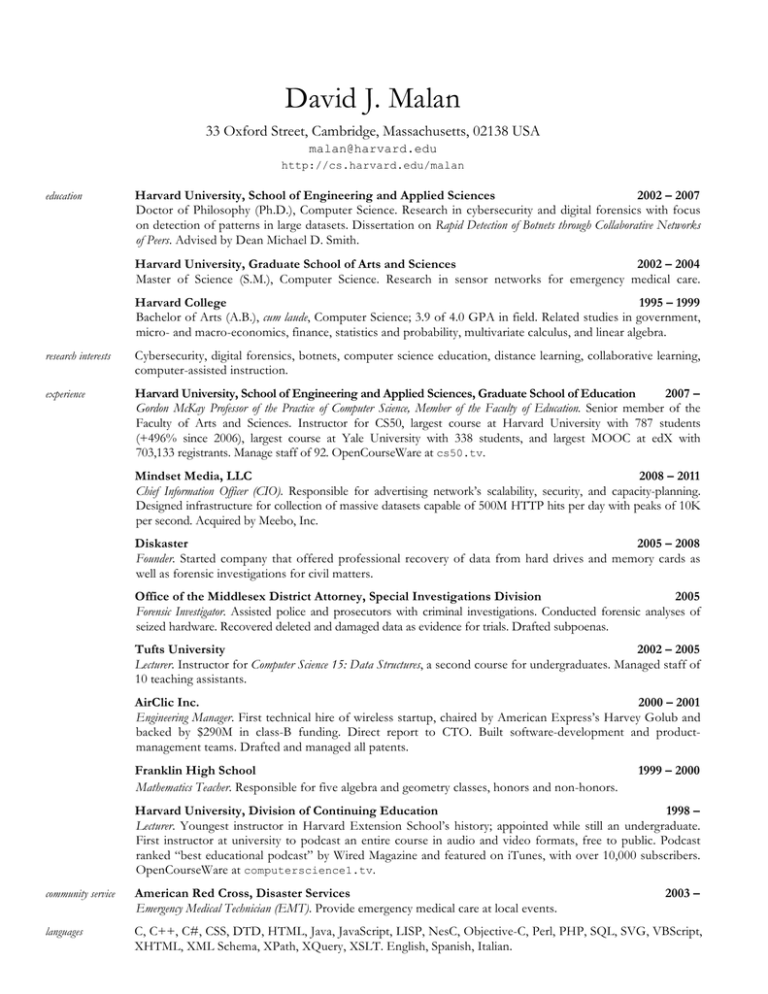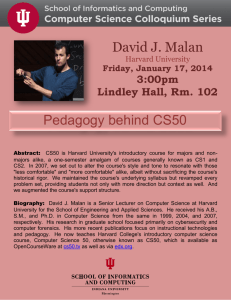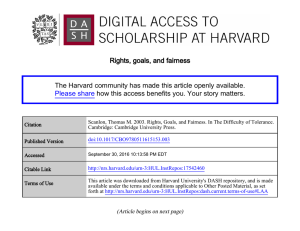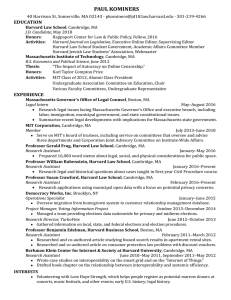David J. Malan - Computer Science
advertisement

David J. Malan 33 Oxford Street, Cambridge, Massachusetts, 02138 USA malan@harvard.edu http://cs.harvard.edu/malan education Harvard University, School of Engineering and Applied Sciences 2002 – 2007 Doctor of Philosophy (Ph.D.), Computer Science. Research in cybersecurity and digital forensics with focus on detection of patterns in large datasets. Dissertation on Rapid Detection of Botnets through Collaborative Networks of Peers. Advised by Dean Michael D. Smith. Harvard University, Graduate School of Arts and Sciences 2002 – 2004 Master of Science (S.M.), Computer Science. Research in sensor networks for emergency medical care. Harvard College 1995 – 1999 Bachelor of Arts (A.B.), cum laude, Computer Science; 3.9 of 4.0 GPA in field. Related studies in government, micro- and macro-economics, finance, statistics and probability, multivariate calculus, and linear algebra. research interests Cybersecurity, digital forensics, botnets, computer science education, distance learning, collaborative learning, computer-assisted instruction. experience Harvard University, School of Engineering and Applied Sciences, Graduate School of Education 2007 – Gordon McKay Professor of the Practice of Computer Science, Member of the Faculty of Education. Senior member of the Faculty of Arts and Sciences. Instructor for CS50, largest course at Harvard University with 787 students (+496% since 2006), largest course at Yale University with 338 students, and largest MOOC at edX with 703,133 registrants. Manage staff of 92. OpenCourseWare at cs50.tv. Mindset Media, LLC 2008 – 2011 Chief Information Officer (CIO). Responsible for advertising network’s scalability, security, and capacity-planning. Designed infrastructure for collection of massive datasets capable of 500M HTTP hits per day with peaks of 10K per second. Acquired by Meebo, Inc. Diskaster 2005 – 2008 Founder. Started company that offered professional recovery of data from hard drives and memory cards as well as forensic investigations for civil matters. Office of the Middlesex District Attorney, Special Investigations Division 2005 Forensic Investigator. Assisted police and prosecutors with criminal investigations. Conducted forensic analyses of seized hardware. Recovered deleted and damaged data as evidence for trials. Drafted subpoenas. Tufts University 2002 – 2005 Lecturer. Instructor for Computer Science 15: Data Structures, a second course for undergraduates. Managed staff of 10 teaching assistants. AirClic Inc. 2000 – 2001 Engineering Manager. First technical hire of wireless startup, chaired by American Express’s Harvey Golub and backed by $290M in class-B funding. Direct report to CTO. Built software-development and productmanagement teams. Drafted and managed all patents. Franklin High School Mathematics Teacher. Responsible for five algebra and geometry classes, honors and non-honors. 1999 – 2000 Harvard University, Division of Continuing Education 1998 – Lecturer. Youngest instructor in Harvard Extension School’s history; appointed while still an undergraduate. First instructor at university to podcast an entire course in audio and video formats, free to public. Podcast ranked “best educational podcast” by Wired Magazine and featured on iTunes, with over 10,000 subscribers. OpenCourseWare at computerscience1.tv. community service American Red Cross, Disaster Services Emergency Medical Technician (EMT). Provide emergency medical care at local events. 2003 – languages C, C++, C#, CSS, DTD, HTML, Java, JavaScript, LISP, NesC, Objective-C, Perl, PHP, SQL, SVG, VBScript, XHTML, XML Schema, XPath, XQuery, XSLT. English, Spanish, Italian. David J. Malan / 2 academic service Faculty Associate. Berkman Klein Center for Internet & Society at Harvard University. July 2016 – present. Board of Directors. Harvard Student Agencies. February 2016 – present. Faculty Council. Faculty of Arts and Sciences, Harvard University. January 2016 – present. Allston Classroom Design Committee. School of Engineering and Applied Sciences, Harvard University. July 2015 – present. Provost’s Task Force on SEAS Concentrators. Harvard University. April 2013 – present. HarvardX Faculty Committee. Harvard University. September 2012 – present. Faculty Standing Committee on Information Technology. Faculty of Arts and Sciences, Harvard University. September 2011 – present. refereed publications conferences, journals From Cluster to Cloud to Appliance. David J. Malan. 18th Annual ACM Conference on Innovation and Technology in Computer Science Education. Canterbury, England. July 2013. Streamlining Grading toward Better Feedback. Tommy MacWilliam and David J. Malan. 18th Annual ACM Conference on Innovation and Technology in Computer Science Education. Canterbury, England. July 2013. Engaging Students through Video: Integrating Assessment and Instrumentation. Tommy MacWilliam, R.J. Aquino, and David J. Malan. 18th Annual Conference of the Northeast Region of the Consortium for Computing Sciences in Colleges. Loudonville, New York. April 2013. CS50 Sandbox: Secure Execution of Untrusted Code. David J. Malan. 44th ACM Technical Symposium on Computer Science Education. Denver, Colorado. March 2013. Scaling Office Hours: Managing Live Q&A in Large Courses. Tommy MacWilliam and David J. Malan. 28th Annual Conference of the Eastern Region of the Consortium for Computing Sciences in Colleges. Galloway, New Jersey. November 2012. Moving CS50 into the Cloud. David J. Malan. 15th Annual Conference of the Northeast Region of the Consortium for Computing Sciences in Colleges. Hartford, Connecticut. April 2010. Reinventing CS50. David J. Malan. 41st Annual ACM Technical Symposium on Computer Science Education. Milwaukee, Wisconsin. March 2010. Virtualizing Office Hours in CS 50. David J. Malan. 14th Annual ACM Conference on Innovation and Technology in Computer Science Education. Paris, France. July 2009. Implementing Public-Key Infrastructure for Sensor Networks. David J. Malan, Matt Welsh, and Michael D. Smith. ACM Transactions on Sensor Networks. Volume 4, Issue 4. November 2008. Scratch for Budding Computer Scientists. David J. Malan and Henry H. Leitner. 38th Annual ACM Technical Symposium on Computer Science Education. Covington, Kentucky. March 2007. Podcasting Computer Science E-1. David J. Malan. 38th Annual ACM Technical Symposium on Computer Science Education. Covington, Kentucky. March 2007. Advanced Forensic Format: An Open, Extensible Format for Disk Imaging. Simson L. Garfinkel, David J. Malan, Karl-Alexander Dubec, Christopher C. Stevens, and Cecile Pham. Second Annual IFIP WG 11.9 International Conference on Digital Forensics. Orlando, Florida. January 2006. A Public-Key Infrastructure for Key Distribution in TinyOS Based on Elliptic Curve Cryptography. David J. Malan, Matt Welsh, and Michael D. Smith. First IEEE International Conference on Sensor and Ad hoc Communications and Networks. Santa Clara, California. October 2004. refereed publications Grading Qualitatively with Tablet PCs in CS 50. David J. Malan. Workshop on the Impact of Pen-Based workshops Technology on Education. Blacksburg, Virginia. October 2009. Exploiting Temporal Consistency to Reduce False Positives in Host-Based, Collaborative Detection of Worms. David J. Malan and Michael D. Smith. ACM Workshop on Rapid Malcode. Fairfax, Virginia. November 2006. One Big File Is Not Enough: A Critical Evaluation of the Dominant Free-Space Sanitization Technique. Simson L. Garfinkel and David J. Malan. 6th Workshop on Privacy Enhancing Technologies. Cambridge, United Kingdom. June 2006. David J. Malan / 3 Host-Based Detection of Worms through Peer-to-Peer Cooperation. David J. Malan and Michael D. Smith. ACM Workshop on Recurring Malcode. Fairfax, Virginia. November 2005. CodeBlue: An Ad Hoc Sensor Network Infrastructure for Emergency Medical Care. David Malan, Thaddeus Fulford-Jones, Matt Welsh, and Steve Moulton. ACM Workshop on Applications of Mobile Embedded Systems. Boston, Massachusetts. June 2004. CodeBlue: An Ad Hoc Sensor Network Infrastructure for Emergency Medical Care. David Malan, Thaddeus Fulford-Jones, Matt Welsh, and Steve Moulton. International Workshop on Wearable and Implantable Body Sensor Networks. London, United Kingdom. April 2004. unrefereed publications “Sensor Networks for Emergency Response: Challenges and Opportunities.” Konrad Lorincz, David J. Malan, Thaddeus R.F. Fulford-Jones, Alan Nawoj, Antony Clavel, Victor Shnayder, Geoff Mainland, Steve Moulton, and Matt Welsh. IEEE Pervasive Computing. October – December, 2004. Low-Power, Secure Routing for MICA2 Mote. Breanne Duncan and David Malan. Harvard University Technical Report TR-06-04. March 2004. Summary Structures for XML. David Malan. Harvard University Technical Report TR-05-04. March 2004. Crypto for Tiny Objects. David Malan. Harvard University Technical Report TR-04-04. January 2004. undergraduate research advising R.J. Aquino ’14. Engaging Students through Video: Integrating Assessment and Instrumentation. Tommy MacWilliam ’13. Engaging Students through Video: Integrating Assessment and Instrumentation. Scaling Office Hours: Efficiently Managing Live Q&A in Large Courses. Streamlining Grading toward Better Feedback. Horia Mihail Teodorescu ’11. A Collective Biological Processing Algorithm for ECG Signals. Swarm Filtering and Application to MRI Mammography. Image re-morphing and feature extraction with swarming algorithm. invited talks CS50 Communities. Building Learning Communities Education Conference 2016. Boston, Massachusetts. July 2016. Dockerizing CS50: From Cluster to Cloud to Appliance to Container. DockerCon 2016. Seattle, Washington. June 2016. It's Peanut Butter Jelly Time!!! 2016 National CAS Conference for Teachers of Computing. Birmingham, United Kingdom. June 2016. From Cambridge to New Haven. The Teagle Foundation. New York, New York. February 2016. Online Learning and MOOCS—The Next Ten Years. Harvard Higher Education Leaders Forum. Graduate School of Education, Harvard University. Cambridge, Massachusetts. January 2016. This is CS50 (AP). Building Learning Communities Education Conference 2015. Boston, Massachusetts. July 2015. Rebooting CS50. Microsoft Research. Redmond, Washington. June 2015. Transforming CS50. University of Rhode Island. Kingston, Rhode Island. May 2015. Een inspiratiebron voor vernieuwing van het programmeeronderwijs. International Keynote. Nationaal Informatica Onderwijs Congres (NIOC) 2015. Enschede, Netherlands. April 2015. Week 4, continued. Miami Dade College. Miami, Florida. April 2015. Virtual Computing Enviroments for Instruction in Higher Education: A Show Case of Successful Implementations and Uses. E-Learn 2014: World Conference on E-Learning. New Orleans, Louisiana. October 2014. Pedagogy behind CS50 and CS50x. MOOCLab, University of California, Berkeley. Berkeley, California. January 2014. Pedagogy behind CS50. Computer Science Colloquium. School of Informatics and Computing, Indiana University. January 2014. Pedagogy behind CS50. CSE Colloquium. University of Washington. Seattle, Washington. January 2014. Pedagogy behind CS50. CS Department Colloquium Series. Princeton University. Princeton, New Jersey. December 2013. David J. Malan / 4 This was CS50x. Lifelong Kindergarten Group. Media Lab, Massachusetts Institute of Technology. Cambridge, Massachusetts. May 2013. This is CS50. Department Lectures. Columbia University. New York, New York. May 2013. Experimenter Award. Experiment Fund. Cambridge, Massachusetts. April 2013. Rediscovering the Passion, Beauty, Joy, and Awe: Making Computing Fun Again, part 6. Daniel D. Garcia, Valerie Barr, Mark Guzdial, David J. Malan. 44th ACM Technical Symposium on Computer Science Education. Denver, Colorado. March 2013. Campus Shuttle. Nifty Assignments, 44th ACM Technical Symposium on Computer Science Education. Denver, Colorado. March 2013. This is CS50. Computer Science Colloquium. Yale University. New Haven, Connecticut. February 2013. This is CS50. CS Seminars. College of Engineering and Mathematical Sciences, University of Vermont. Burlington, Vermont. February 2013. This is CS50. CS4HS. Duke University. Durham, North Carolina. October 2012. CSI: Computer Science Investigation. Nifty Assignments, 41st ACM Technical Symposium on Computer Science Education. Milwaukee, Wisconsin. March 2010. BMP Puzzles. Nifty Assignments, 41st ACM Technical Symposium on Computer Science Education. Milwaukee, Wisconsin. March 2010. The New CS 50. Colloquium on Computer Science Pedagogy. Carnegie Mellon. Pittsburgh, Pennsylvania. October 2009. Teaching Computer Science in the Cloud. 2009 USENIX Annual Technical Conference. San Diego, California. June 2009. Scratch @ Harvard. Scratch@MIT Conference. Cambridge, Massachusetts. July 2008. Podcasting E-1: It’s All About Access. Podcast Academy at Boston University. Boston, Massachusetts. April 2006. Toward PKI for Sensor Networks. BBN Technologies. Cambridge, Massachusetts. November 2004. talks From Harvard to edX to Yale to K12. Harvard Club of Washington DC. Washington, DC. April 2016. Abstraction. Visitas Thinks Big 2016. Harvard University. April 2016. From Harvard to edX to Yale to K12, This is CS50, CS50x, and CS50 AP: An Introduction to the Intellectual Enterprises of Computer Science and the Art of Programming. Venture Capital 2016. Harvard Business School. April 2016. What Tech Skills will Liberal Arts Graduates Need for 21st Century Careers. Office of Career Services. Harvard University. Cambridge, Massachusetts. August 2015. Computer Science Principles Curricula. CSTA Annual Conference 2015. Grapevine, Texas. July 2015. CS50 for MBAs: Computer Science for Business Leaders. Spring Reunion. Harvard Business School. Cambridge, Massachusetts. May 2015. This is CS50. 20th Reunion of the Class of 1995. Harvard College. Cambridge, Massachusetts. May 2015. CS50 Cult(ure). Visitas Thinks Big. Harvard College. Cambridge, Massachusetts. April 2015. Computational Thinking. Junior Parents Weekend. Harvard College. Cambridge, Massachusetts. February 2015. CS50 Cult(ure). Harvard Thinks Big. Harvard College. Cambridge, Massachusetts. February 2015. Content Distribution and Archival in a Digital Age. Harvard IT Summit. Harvard University. Cambridge, Massachusetts. June 2014. This is CS50. Harvard Today: A Faculty Forum. Faculty of Arts and Sciences, Harvard University. Cambridge, Massachusetts. May 2014. hello, computational thinking. Visitas Thinks Big. Harvard College. Cambridge, Massachusetts. April 2014. David J. Malan / 5 The Geek Shall Inherit the Earth. Master Classes. Harvard Graduate School of Education. Cambridge, Massachusetts. February 2014. This is CS50: The Pedagogy behind Harvard’s Introduction to Computer Science. Program on Innovation in Higher Education. Academic and Professional Programs for the Americas (LASPAU), Harvard University. Cambridge, Massachusetts. November 2013. Lessons Learned from CS50x. ABCD Committee. Harvard University. Cambridge, Massachusetts. October 2013. How can we evaluate 40,000 students? Graduate School of Arts and Sciences, Harvard University. Cambridge, Massachusetts. May 2013. The Art of Programming. HAA Faculty Forum. Harvard University. Cambridge, Massachusetts. May 2013. This was CS50x v1. FAS Campaign Steering Committee. Harvard University. Cambridge, Massachusetts. May 2013. This is CS50x. Teacher Learning and Technology (T-553). Graduate School of Education, Harvard University. Cambridge, Massachusetts. February 2013. This is CS50x. HarvardX Town Hall. Harvard University. Cambridge, Massachusetts. February 2013. This is CS50x. School of Engineering and Applied Sciences, Harvard University. Cambridge, Massachusetts. December 2012. This is CS50x. Campaign Advisory Group. School of Engineering and Applied Sciences, Harvard University. Menlo Park, California. November 2012. The Geek Shall Inherit the Earth: Computer Science in an MBA Program. Fall Reunion. Harvard Business School, Harvard University. Allston, Massachusetts. October 2012. The Geek Shall Inherit the Earth. 40th Reunion of the Class of 1972. Harvard College. Cambridge, Massachusetts. September 2012. This is CS50. Alumni Day. Harvard Business School, Harvard University. Allston, Massachusetts. June 2012. The Geek Shall Inherit the Earth. Visitas Thinks Big. Harvard University. Cambridge, Massachusetts. April 2012. The Geek Shall Inherit the Earth. Alumni Day. Graduate School of Arts and Sciences, Harvard University. Cambridge, Massachusetts. April 2012. Innovative Teaching in the Sciences at Harvard. Program on Effective Teaching in Engineering. Academic and Professional Programs for the Americas (LASPAU), Harvard University. Cambridge, Massachusetts. March 2012. Mobile Apps Basics. ABCD Video Multimedia Group. Harvard University. Cambridge, Massachusetts. February 2012. This is CS50. HILT Symposium. Harvard University. Cambridge, Massachusetts. February 2012. Security. HackHarvard Incubator. Harvard University. Cambridge, Massachusetts. January 2012. Usando a tecnologia efetivamente para melhorar o ensino de graduação. Critical Issues and Strategies for Leaders of Modern Universities. Cambridge, Massachusetts. April 2011. Active Learning. Conversations@FAS, Harvard University. Cambridge, Massachusetts. February 2011. The Geek Shall Inherit the Earth. Harvard Thinks Big. Cambridge, Massachusetts. February 2010. tutorials A Web-Based IDE for Teaching with Any Language. Dan Armendariz, David J. Malan, and Nikolai Onken. 47th ACM Technical Symposium on Computing Science Education. Memphis, Tennessee. March 2016. Implementing a Massive Open Online Course (MOOC). 18th Annual Conference of the Northeast Region of the Consortium for Computing Sciences in Colleges. Loudonville, New York. April 2013. Moving Your Course into the Cloud. 41st Annual ACM Technical Symposium on Computer Science Education. Milwaukee, Wisconsin. March 2010. David J. Malan / 6 Starting with Scratch (literally) in CS 1. 41st Annual ACM Technical Symposium on Computer Science Education. Milwaukee, Wisconsin. March 2010. Replacing Real Servers with Virtual Machines Using Amazon Elastic Compute Cloud (EC2). 23rd Large Installation System Administration Conference (LISA ’09). Baltimore, Maryland. November 2009. Replacing Real Servers with Virtual Machines Using Amazon Elastic Compute Cloud (EC2) and Simple Storage Service (S3). 2009 USENIX Annual Technical Conference. San Diego, California. June 2009. courses Computer Science 50: Introduction to Computer Science I 2007 – Harvard College Introduction to the intellectual enterprises of computer science and the art of programming. This course teaches students how to think algorithmically and solve problems efficiently. Topics include abstraction, algorithms, data structures, encapsulation, resource management, security, software engineering, and web development. Languages include C, PHP, and JavaScript plus SQL, CSS, and HTML. Problem sets inspired by real-world domains of biology, cryptography, finance, forensics, and gaming. Designed for concentrators and non-concentrators alike, with or without prior programming experience. CS50 for MBAs: Computer Science for Business Leaders 2015 – Harvard Business School This course is a variant of Harvard College's introduction to computer science, CS50, designed especially for MBA students. Whereas CS50 itself takes a bottom-up approach, emphasizing mastery of low-level concepts and implementation details thereof, this course takes a top-down approach, emphasizing mastery of high-level concepts and design decisions related thereto. Through a mix of technical instruction, discussion of case studies, and weekly programming projects, this course empowers students to make technological decisions even if not technologists themselves. Topics include cloud computing, networking, privacy, scalability, security, and more, with a particular emphasis on web and mobile technologies. Students emerge from this course with first-hand appreciation of how it all works and all the more confident in the factors that should guide their decision-making. Computer Science 164: Software Engineering 2012 – Harvard College Introduction to principles of software engineering and best practices, including code reviews, source control, and unit tests. Topics include Ajax, database schemas, event handling, HTTP, MVC, object-oriented design, and user experience. Projects include web apps with front-end UIs (mobile and desktop) and back-end APIs. Languages include JavaScript and PHP. Computer Science 15: Data Structures 2002 – 2005 Tufts University A second course in computer science. Data structures and algorithms are studied through major programming projects in the C++ programming language. Topics include linked lists, trees, graphs, dynamic storage allocation, and recursion. Computer Science E-1: Understanding Computers and the Internet 1999 – 2011 Harvard Extension School This course is all about understanding: understanding what’s going on inside your computer when you flip on the switch, why tech support has you constantly rebooting your computer, how everything you do on the Internet can be watched by others, and how your computer can become infected with a worm just by being turned on. Designed for students who use computers and the Internet every day but don’t fully understand how it all works, this course fills in the gaps. Through lectures on hardware, software, the Internet, multimedia, security, privacy, website development, programming, and more, this course “takes the hood off” of computers and the Internet so that students understand how it all works and why. Through discussions of current events, students are exposed also to the latest technologies. David J. Malan / 7 Computer Science E-75: Building Dynamic Websites 2008 – 2012 Harvard Extension School Today’s websites are increasingly dynamic. Pages are no longer static HTML files but instead generated by scripts and database calls. User interfaces are more seamless, with technologies like Ajax replacing traditional page reloads. This course teaches students how to build dynamic websites with Ajax and with Linux, Apache, MySQL, and PHP (LAMP), one of today’s most popular frameworks. Students learn how to set up domain names with DNS, how to structure pages with XHTML and CSS, how to program in JavaScript and PHP, how to configure Apache and MySQL, how to design and query databases with SQL, how to use Ajax with both XML and JSON, and how to build mashups. The course explores issues of security, scalability, and cross-browser support and also discusses enterprise-level deployments of websites, including third-party hosting, virtualization, colocation in data centers, firewalling, and load-balancing. Computer Science E-76: Building Mobile Applications 2011 – 2013 Harvard Extension School Today’s applications are increasingly mobile. Computers are no longer confined to desks and laps but instead live in our pockets and hands. This course teaches students how to build mobile apps for Android and iOS, two of today’s most popular platforms, and how to deploy them in Android Market and the App Store. Students learn to write native apps for Android using Eclipse and the Android SDK, to write native apps for iPhones, iPod touches, and iPads using Xcode and the iOS SDK, and to write web apps for both platforms. Computer Science E-259: XML with Java, Java Servlet, and JSP 2004 – 2008 Harvard Extension School This course introduces XML as a key enabling technology in Java-based applications. Students learn the fundamentals of XML and its derivatives, including DTD, SVG, XML Schema, XPath, XQuery, XSL-FO, and XSLT. Students also gain experience with programmatic interfaces to XML like SAX and DOM, standard APIs like JAXP and TrAX, and industry-standard software like Ant, Tomcat, Xerces, and Xalan. The course acquaints students with J2EE, including JavaServer Pages (JSP) and Java Servlet, and also explores HTTP, SOAP, web services, and WSDL. The course’s projects focus on the implementation and deployment of these technologies. Computer Science P-14300: Introduction to Web Programming 2015 – Harvard Summer School This course introduces students to the principles and practice of web programming. The session begins with a brief introduction to HTML and CSS and quickly transitions to server-side programming with PHP and clientside scripting with JavaScript. Topics include Ajax, DOM, event handling, HTTP, MVC, relational databases, and user experience. Projects include web apps with front-end user interfaces (mobile and desktop) and backend application programming interfaces. Computer Science S-1: Great Ideas in Computer Science with Java 2003 – 2010 Harvard Summer School This course is an introduction to the most important discoveries and intellectual paradigms in computer science, designed for students with little or no previous background. We explore problem-solving methods and algorithm development using such high-level programming languages as Java and JavaScript. Students learn how to design, code, debug, and document programs using techniques of good programming style in a Linux-based environment. This course presents an integrated view of computer systems, from switching circuits and machine language through compilers and GUI design. We examine theoretical and practical limitations related to unsolvable and intractable computational problems, and the social and ethical dilemmas presented by such issues as software unreliability and invasion of privacy.



